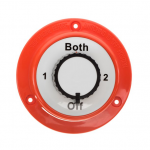ADDvanced
Member

So here's the basic layout.... the van will have a small house battery to power the 2kw heater (this is the bedroom). The trailer will have a kitchen/work/bathroom and a big battery bank of 2 6v golf cart batteries, and solar panels. The van will not have solar.
So I'm not sure how to manage the smaller house battery for the heater in the van, maybe just a 'dumb' battery switch and click it to 'both' while driving, and leave it off when stationary?
For the trailer... I think a DC to DC charger makes sense, but I would need to run thick cables to the DC to DC charger, correct? So if I mount that on the van... I'd need to run a lot of heavy, expensive cable to get to it, but it needs to be there because that's where the solar controller would be. I see that there are some combination MPPT/DC to DC chargers... but again... how does this work with a house battery in the van as well?
Lastly... is there a way to pull power from the battery bank in the trailer TO the van at night? Maybe eliminate the house battery in the van entirely and rely on the power from the trailer? How would that work?
I have a decent grasp of electrical layout/theory, but my build is sort of strange/weird/different so it's not as straight forward as a single house battery all in one vehicle.

